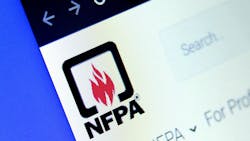The title of Annex Q is “Human Performance and Workplace Electrical Safety”. It consists of eight sections, Q.1 through Q.8.
Q.1 provides a brief discussion of the concept of human performance and how it may be applied to electrical safety. Among the facts presented here is that human error is often a root cause of safety incidents. Most of what follows is geared toward managing this fundamental issue.
Q.2 enumerates the five principles of human performance. The first one on the list is arguably the most important one to understand and embrace. Hubris, or the belief that you don’t or can't make mistakes, has proven to be erroneous. So the first stated principle is people are fallible, and even the best people make mistakes. Another principle is error-likely situations and conditions are predictable, manageable, and preventable.
Q.3 explains how the brain processes information in a series of interactive stages. A key fact it covers is that we have a limited supply of attention.
Q.4 looks at human performance modes and associated errors. The modes are rule-, knowledge-, and skill-based.
Q.5 looks at error precursors and the four broad categories into which they can be grouped. One of those, for example, is “task demands.” The demands of the task (mental, physical, or team requirements) exceed the capabilities or challenge the limitations of the individual. Table Q.5 provides an overview.
Q.6 looks at eight human performance tools. Among these are the “self-check with verbalization” tool and the “stop when unsure” tool.
Q.7 discusses human performance warning flags. These derive from common process, organizational, supervisory, and worker performance weaknesses.
Q.8 discusses the workplace culture. Among other things, it states that workers, supervisors, and managers must all work together to implement strong human performance.
About the Author

Mark Lamendola
Mark is an expert in maintenance management, having racked up an impressive track record during his time working in the field. He also has extensive knowledge of, and practical expertise with, the National Electrical Code (NEC). Through his consulting business, he provides articles and training materials on electrical topics, specializing in making difficult subjects easy to understand and focusing on the practical aspects of electrical work.
Prior to starting his own business, Mark served as the Technical Editor on EC&M for six years, worked three years in nuclear maintenance, six years as a contract project engineer/project manager, three years as a systems engineer, and three years in plant maintenance management.
Mark earned an AAS degree from Rock Valley College, a BSEET from Columbia Pacific University, and an MBA from Lake Erie College. He’s also completed several related certifications over the years and even was formerly licensed as a Master Electrician. He is a Senior Member of the IEEE and past Chairman of the Kansas City Chapters of both the IEEE and the IEEE Computer Society. Mark also served as the program director for, a board member of, and webmaster of, the Midwest Chapter of the 7x24 Exchange. He has also held memberships with the following organizations: NETA, NFPA, International Association of Webmasters, and Institute of Certified Professional Managers.
